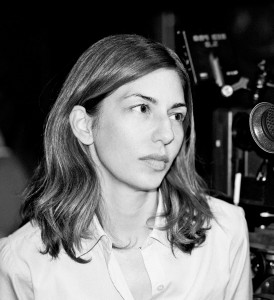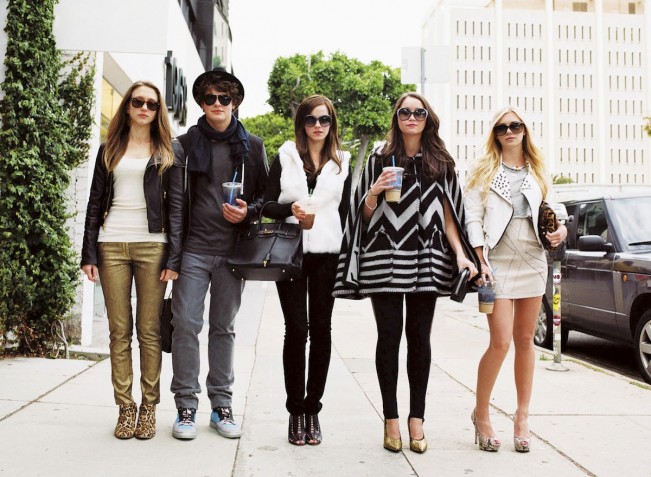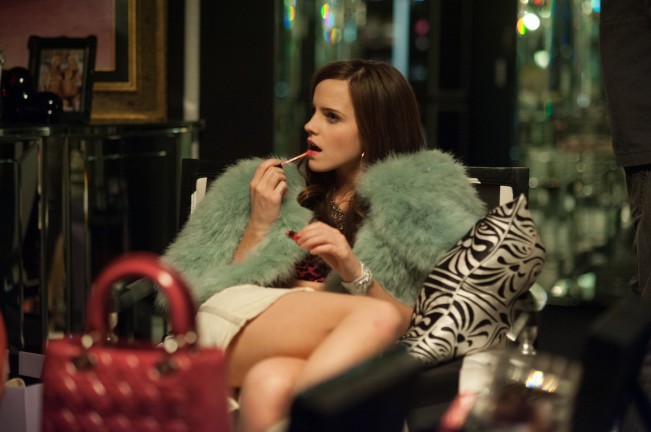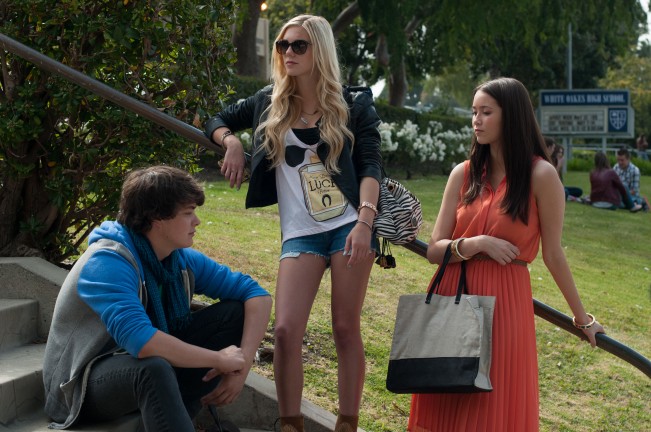

By Mike Wilmington Wilmington@moviecitynews.com
Wilmington on Movies: The Bling Ring
THE BLING RING (Three Stars)
U.S.: Sofia Coppola, 2013
OmiGod!
That’s the most frequently exclaimed exclamation in Sofia Coppola’s The Bling Ring—I’ll bet I heard it in the movie at least a hundred times—and the phrase fits this picture and its people like a Gucci glove or like Louboutin shoes or like a critical cliche. It‘s used constantly by the title characters, an amateur bunch of L. A.-area teenaged thieves who pull heists at celebrity homes, and it can have a slightly toxic effect. Say it a few times, and you can almost feel the brain cells seeping out of your head. OmiGod! OmiGod! OmiGod!
What the catchphrase means—”I don‘t believe it!” or “ This is amazing!“ or maybe just “Hosanna!“—may affect you less than the mock-religious quality of its incessant repetition by the Blingers. They were a gang of four wannabe-fashionista girls, and one computer geek boy from the San Fernando Valley. Based on real life kids who were the subjects of a Vanity Fair article about their crimes, they became famous for going on joy-raids into the homes of the celebrity rich of Los Angeles-and-thereabouts, and stealing their bling: that is, their jewelry, shoes, objets d’art and fancy clothes and occasionally wads of dough the owners just leave lying around the place.
These were no petty robberies, and they aren‘t in the movie either. The kids—whose targets included Lindsay Lohan, Megan Fox, Orlando Bloom, Rachel Bilson, and most famously, Paris Hilton—netted nearly three million dollars worth of loot, though they got considerably less than that from the fences. And the raids were ridiculously easy. The fictionalized gang—including ringleader Rebecca (Katie Chang), Nicki (Emma Watson), and the only guy, Marc (Israel Broussard)—simply checked up on their favorite celebs on the Internet, found when they were going out of town on some celebrity gig and then went on their “shopping“ expeditions in the empty and unprotected homes.
These are a brazen but pretty inexperienced bunch. They never broke into the houses, but always got in through open doors or windows or with keys left under the mats. And they got their booty from people who had so much stuff that some of them, like Paris Hilton, didn’t even know, at first, that anything was missing. They were caught because they were incredibly stupid. They totally ignored the surveillance cameras some of their victims had on, and they sent out Facebook pictures of themselves waving the loot. OmiGod!
Director-writer Coppola shows the Bling Ring for what they were: selfish and dopey, and she shows them with clarity and candor that mark all her films. Coppola makes American indie films that look like European films—The Virgin Suicides, Lost in Translation, Marie Antoinette and Somewhere—and this is a European-style movie as well. But it’s also one of her most American films, in theme,  subject and performances. These greedy, reckless, lazy, good-looking, mostly arrogant kids, obsessed with celebrity, obsessed with looks and loot, are the faces of the American wannabe idle rich, and Paris’s swanky domicile, which didn’t seem to contain a single book, is a kind of equivalent of Gatsby’s glittering mansion, except that it’s empty, in more ways than one.
subject and performances. These greedy, reckless, lazy, good-looking, mostly arrogant kids, obsessed with celebrity, obsessed with looks and loot, are the faces of the American wannabe idle rich, and Paris’s swanky domicile, which didn’t seem to contain a single book, is a kind of equivalent of Gatsby’s glittering mansion, except that it’s empty, in more ways than one.
But the movie still looks and feels European. It‘s not all sharp edges, and bright light pouring down on hunks and hotties,. It has that misty, dreamy, well-textured look Coppola always got from her excellent longtime cinematographer Harris Savides (who also worked for David Fincher). Savides bec ame ill during the shooting and later died, and he was replaced by his assistant, Christopher Blauvet, who does a beautiful, unobtrusive job. Perhaps not as beautiful as Savides’, who was responsible for the film’s single most widely-discussed and praised shot, the long stationary take of Audrina Partridge’s home, at nighttime, with the Bling Ring moving from room to glass-walled room, picking up swag.
The cast is led by Katie Chang, who makes a marvelous flirty psychopath out of Rebecca, by Israel Broussard, who does a nice variation on the usual high-school movie outsider kid who improbably gets the girl (or girls), and by Emma Watson (Hermione of the Harry Potter movies) who is a little scary as the gang‘s most self-deluded outlaw Nicki. (Nicki thinks the life-lessons from this experience will serve her well when she becomes a philanthropist or world leader.)
The others in the gang, all fine, imclude Tarmissa Farmiga as Sam, and Claire Allen as Chloe—and they all, singly or together, help paint this eerie portrait of the young, the selfish, and the vacuous—the image-crazy, bling-crazy products of a youth-intoxicated culture. The best acting in the movie though, is by the actress playing one of the film’s handful of parents: Leslie Mann as Nicki’s blissfully silly mom Laurie. Laurie is as thoughtless as her daughter is acquisitive. And Mann’s big acting moment comes when she leads some of the girls in witlessly clichéd new age self-helpish prayers—when you’d think a simple chorus of “OmiGods!” would have been more appropriate.
I liked the film very much at first. The best of it seems a sharp-eyed, sometimes stunning look at the utter vacuousness and amorality of much of the more visible modern culture. But it seemed to float away afterwards, and I think it needs more acid in its system. The film presents its gang as a little juiceless and too banal. There’s little or no sex in their routines and not even much heat. The kids, except for the notable nasty and manipulative Rebecca, seem almost empty, waiting for a camera and a paparazzo to bring them some life. They are hooked on acquisition, on their addled dreams of becoming rich and famous and beautiful, or “famous for being famous.” As if to demonstrate this view, Paris Hilton appears in the film as herself and lends her digs—one of the actual crime scenes—to Sofia for the shoot. Her house looks like a set—and like the other sets impersonating the homes of Lindsay Lohan and the others.
So what’s the message? Does it need one? Is it a simple matter of getting more surveillance equipment, and maybe some guns? Me, I thought the message might be was as simple as the Biblical saying “The love of money is the root of all evil.” Isn’t that right? Isn’t that how it all really comes down? Like totally. OmiGod!
















